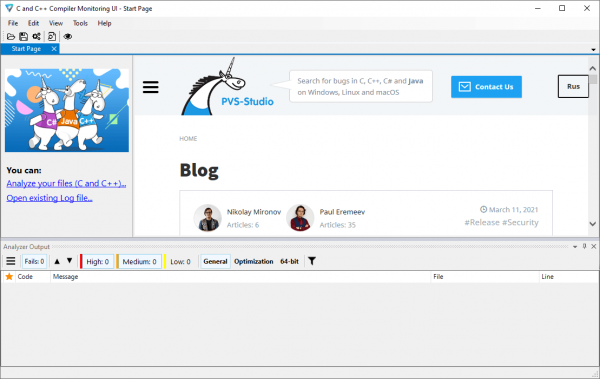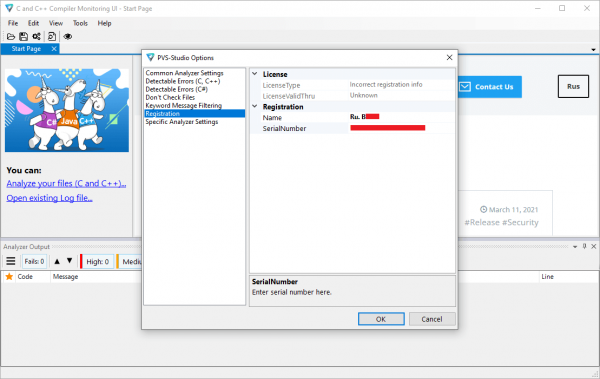Overview:

PVS-Studio 7.41.103095.2136 Crack is a tool for detecting bugs and security vulnerabilities in the source code of programs, which are written in C, C ++, C #, and Java. It works on 64-bit systems in Windows, Linux, and macOS environments and can analyze source code for 32-bit, 64-bit, and embedded ARM platforms.
PVS-Studio 7.41.103095.2136 License Key performs static code analysis and generates reports that help programmers find and fix bugs. PVS-Studio performs a variety of code checks and is also useful for finding typographical errors and copying and pasting. Examples of such errors are V501, V517, V522, V523, and V3001.
The main value of static analysis lies in its routine use so that errors are identified and corrected as soon as possible. There is no point in wasting 50 hours looking for bugs that can be found with a static scan. So, we’ll show you again – the main idea of static analysis is not to find a hidden bug the day before release but to fix dozens of bugs day after day.
The scanner can run overnight on the server and will automatically warn of suspicious code fragments. Ideally, these errors can be detected and corrected before they enter the version control system. PVS-Studio 7.41.103095.2136 Patch can be started automatically as soon as the file compiler has just changed. It works on Windows, Linux, and macOS.
PVS-Studio 7.41.103095.2136 Serial Key integrates with the Visual Studio 2010-2019 development environment. If you are using this IDE, just go to the PVS-Studio section of the menu and select “Check Current Projects”. However, this is often a more complicated process, requiring you to integrate PVS-Studio into even an exotic build system. The subject of such integration is too broad to be described here. You can find all the relevant information in our detailed documentation.
One more thing to note – PVS-Studio 7.41.103095.2136 Keygen for Windows and Linux provides special tools, which can collect build information during build. These tools allow a quick analysis of a project regardless of the construction system. You can quickly test the parser’s capabilities, without wasting time integrating it with make files or other build scripts.
PVS-Studio 7.41.103095.2136 Key Features:
- Simple and seamless integration with Visual Studio 2010-2019.
- Automatically scan individual files after recompiling them.
- Online reference guide for all diagnostic rules, available locally, on our website, and as a single .pdf file. Over 700 pages of documentation!
- Storage and load analysis results allow overnight checks – at night the analyzer performs the analysis and gives you the results in the morning.
- You can save scan results in HTML format with full source code navigation.
- Analysis can be performed from the command line: it helps to integrate PVS-Studio into the night build; new newspapers will be issued in the morning.
- High scalability: Supports multicore and multiprocessor systems with the ability to specify the number of cores to use; IncrediBuild support for distributed analysis.
- Interactive filtering of scan results (log files) in the PVS-Studio window: by diagnostic rule number, file name, keyword in diagnostic text, etc.
- Automatic checks for updates (in the IDE and when running builds overnight).
- Blame-notifier utility: This tool allows you to send email notifications to developers about bugs PVS-Studio found while running overnight.
- Analyze commit, merge, and drag requests – the analyzer can be configured to scan only changed files. This makes it possible to quickly and automatically analyze each commit in the version control system.
- A large number of integration options in projects developed under Linux and macOS.
- Mark as false alarm – Ability to mark code snippets to hide specific diagnostics on this row.
- Mass Suppression – Ability to hide all existing analyzer messages generated for old codes, so that the analyzer starts reporting 0 warnings. You can always come back to hidden messages later. This feature allows you to seamlessly integrate PVS-Studio into your development process and focus on errors found only in new code.
- Analyzer warning statistics can be viewed in Excel – provides a way to track error correction speed, the number of bugs found during a certain period, etc.
- Relative paths in the report file to display them on different machines.
- The compiler monitoring feature allows the analysis of projects that do not have Visual Studio files (.sln / .vcxproj) without the need to manually integrate with the build system; manual integration into any building system is possible if required.
- PVS-studio-analyzer – Linux compiler monitoring tool.
- Ability to exclude files from scanning by name, folder, or mask; to run a scan on files modified in the last N days.
- Integration with SonarQube – an open-source platform, designed for continuous analysis and measurement of code quality.
- Detection of security and safety weaknesses in the application lifecycle using Static Application Security Testing (SAST) methodology. PVS – Studio was included in the Forrester Research report “Now Tech: Static Application Security Testing, Q3 2020” as a SAST Specialist. This report is available by purchase or by subscription to Forrester Research.
What’s new in PVS-Studio 7.41?
(Released on 10-02-2026)
- As another MISRA coverage expansion stage is concluded, PVS-Studio C++ analyzer diagnostic rules now cover 86% of the MISRA C 2023 standard. In the future releases, we will continue to expand MISRA C++ 2023 standard coverage.
- The C++ analyzer improved its capabilities in analyzing Unreal Engine code. The analyzer now correctly parses the final specifier in virtual functions, and the V557 diagnostic rule properly handles engine containers.
- Support for taint analysis in the C# analyzer was expanded. User annotations can now be added to async methods, and async methods of standard library classes are now mapped.
- The PVS-Studio distributions now include the pvs-fp-cleaner utility, which helps remove redundant false positive suppress markers from the codebase.
- PVS-Studio is implementing a new logging system to collect issues that may arise when using its static analyzers. In the first phase, extended logging was added for the C and C++ cross-platform analyzer. In the next release, we plan to extend logging for the C++ and C# MSBuild analyzer.
- The IntelliJ IDEA plugin was enhanced: now it allows converting analyzer reports to CSV format and provides an option to display relative paths. The slowdown when opening documentation was fixed.
- Runtime errors in the C# analyzer were fixed. These occurred on .NET Core SDK projects which were including Directory.Build.props on systems without Visual Studio installed.
- PVS-Studio Java analyzer now runs with JDK versions higher than 23. The supported Java language version remains unchanged.
- In the Qt Creator plugin on macOS, the evaluation issue was resolved.
- [Breaking change] The analyzer output now follows a consistent CSV format. The converter-generated reports were changed for all platforms.
- [Breaking change] The V2609 diagnostic rule message was changed. Previously suppressed warnings may be reissued in the analyzer report.
- The value of an expression and its persistent side effects must be the same under all permitted evaluation orders and must be independent from thread interleaving.
- Macro parameter immediately following by the ‘#’ operator should not immediately be followed by the ‘##’ operator.
- Tokens that look like a preprocessing directive should not occur within a macro argument.
- Thread objects, thread synchronization objects, and thread-specific storage pointers should only be accessed by the appropriate Standard Library functions.
- Pointers returned by the function ‘localeconv’ / ‘getenv’ / ‘setlocale’ / ‘strerror’ should be used as if they have pointer to const-qualified type.
- Subtraction between pointers should only be applied to pointers that address elements of the same array.
- Comparison with ‘typeof(Nullable)’ is meaningless. Calling ‘GetType()’ on a nullable variable never returns ‘Nullable’.
- Potential RCE vulnerability. Insecure GraalVM context is used to process potentially tainted data.
- Code contains invisible characters that may alter its logic. Consider enabling the display of invisible characters in the code editor.
Screenshots:


How to install & activate it?
- Disconnect from the internet (Recommended).
- Extract and install PVS-Studio 7.41.103095.2136 by using setup.
- After the installation, don’t run the program or exit if launched.
- Copy the crack file to the installation directory and replace it.
- It’s done, enjoy PVS-Studio 7.41.103095.2136 Full Version.
PVS-Studio 7.41.103095.2136 Patch & Serial Key {Tested} Full Version Free Download from the links given below!
